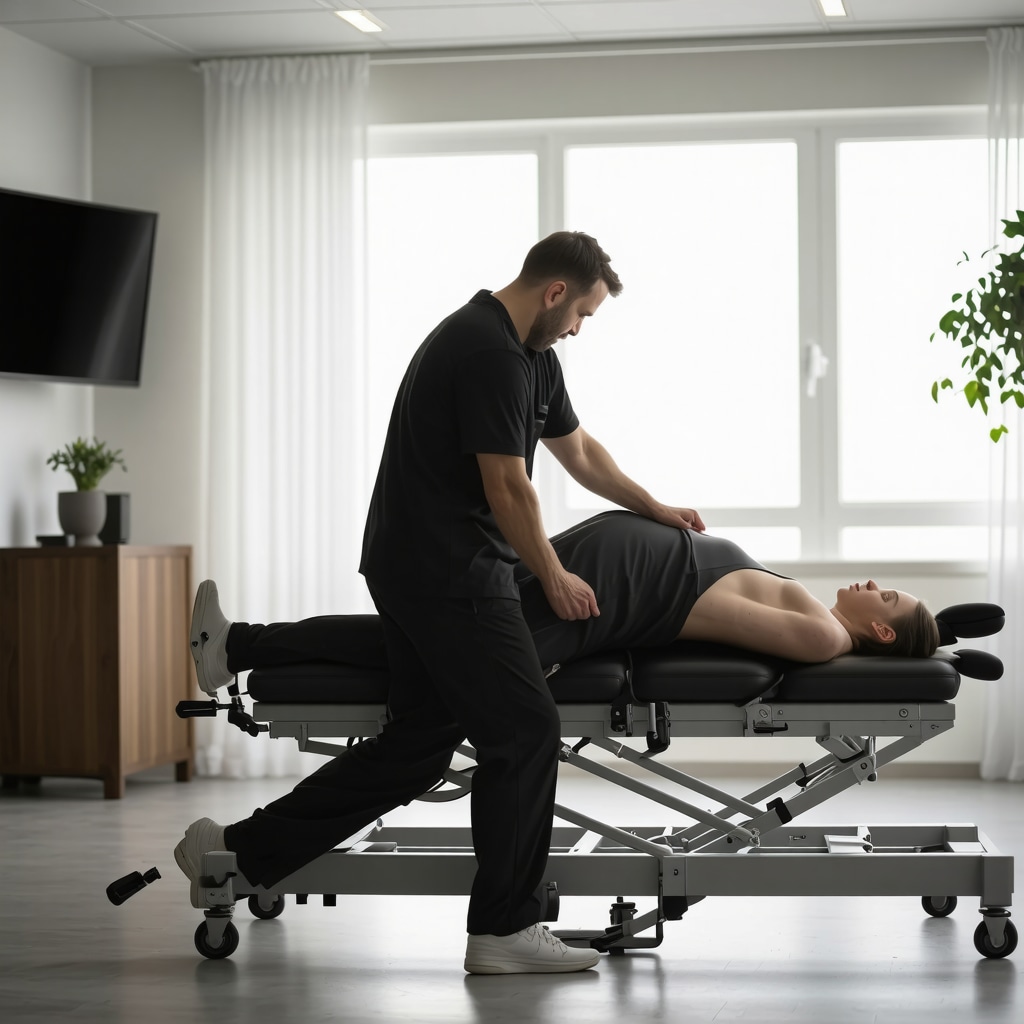My Personal Path to Back Injury Recovery in NJ
Recovering from a back injury was a challenging chapter in my life, and navigating the rehab process in New Jersey added its own unique twists. I remember the initial pain was so intense that I wondered if I’d ever regain my mobility. Through trial and error, and with the help of skilled orthopedic specialists in NJ, I discovered effective strategies that made all the difference.
Understanding the Importance of a Personalized Rehab Plan
Every back injury is distinct, which is why I emphasized the need for a tailored approach. Working closely with my NJ orthopedic doctor, I learned that combining physical therapy with non-invasive treatments could significantly improve recovery outcomes. The key was patience and consistency—something I had to remind myself daily.
Why I Chose Minimally-Invasive Treatments
Initially, I was skeptical about surgical options, but my doctor explained the benefits of minimally-invasive procedures, which often come with fewer risks and quicker recovery times. For instance, minimally-invasive back pain treatments became a pivotal part of my rehab journey. These treatments focus on targeted relief, reducing inflammation, and promoting healing without the need for lengthy hospital stays.
My Daily Routine for Back Rehabilitation
Sticking to a consistent routine was crucial. I incorporated gentle stretches, physical therapy exercises, and ergonomic adjustments inspired by my doctor’s advice. I also explored alternative therapies like chiropractic care, which, according to orthopedic therapy vs. chiropractic treatment, can complement conventional rehab methods effectively.
What are the signs that indicate I need more aggressive treatment?
This question haunted me during my recovery. I learned that persistent numbness, weakness, or worsening pain are red flags that require immediate medical attention. Consulting with a specialist, especially in NJ, can help determine if surgical intervention like spinal decompression or fusion is necessary. For more on this, I recommend checking out warning signs for spine surgery.
If you’re facing similar challenges, I encourage you to reach out to experienced NJ orthopedic surgeons. Their expertise can guide you through effective rehabilitation, ensuring you regain your strength and mobility. Remember, every step forward is a victory—no matter how small.
Feel free to share your own experiences or ask questions in the comments. And if you’re interested in more detailed tips, visit my favorite resource on lumbar fusion rehab tips.
Exploring Advanced Techniques in Spinal Rehab: What Sets Them Apart?
As an orthopedic expert deeply familiar with NJ’s dynamic healthcare landscape, I recognize that spinal rehabilitation has evolved significantly over recent years. Modern approaches integrate cutting-edge minimally-invasive procedures with personalized therapy plans, ensuring faster recovery and better long-term outcomes. Techniques like endoscopic discectomy or percutaneous fusion have revolutionized patient experiences, reducing hospital stays and minimizing post-operative discomfort. Understanding these options helps patients make informed decisions about their care.
How Do Minimally-Invasive Procedures Improve Recovery Times?
Minimally-invasive treatments, such as those detailed at minimally-invasive back pain treatments, focus on reducing tissue trauma. They typically involve smaller incisions, less blood loss, and quicker mobilization. This translates into shorter hospital stays, reduced pain, and faster return to daily activities. For patients in NJ seeking effective relief, these procedures often represent the best balance between efficacy and safety, especially when performed by experienced specialists.
What Are the Practical Considerations When Choosing Your Spine Care Provider?
Beyond selecting a reputable surgeon, understanding their approach to rehabilitation is crucial. An expert in NJ will often collaborate with physical therapists to design comprehensive recovery programs tailored to individual needs. They also consider factors like age, activity level, and specific spinal conditions. For those seeking guidance, resources such as choosing the right orthopedic surgeon can help streamline this process.
Are Non-Surgical Alternatives Still Relevant in Spine Care?
Absolutely. Not every patient requires surgery. Conservative treatments like targeted injections, physical therapy, and lifestyle modifications remain vital first-line options. For example, lumbar fusion rehab tips emphasize the importance of strengthening surrounding muscles and improving flexibility. These approaches can effectively manage pain and restore function, especially when combined with emerging non-invasive therapies like spinal decompression or regenerative medicine.
How Can I Ensure My Treatment Plan Is Both Personalized and Evidence-Based?
Consulting with a multidisciplinary team of NJ specialists ensures your treatment is grounded in the latest scientific research and customized to your unique condition. This might involve advanced diagnostic imaging, functional assessments, and patient education. Staying informed through trusted sources, such as top spine specialists in NJ, empowers you to advocate effectively for your care.
If you’re considering options for your spinal health, don’t hesitate to reach out for expert guidance. Contact a qualified NJ orthopedic surgeon at our contact page and start your journey toward a healthier spine today. And for those interested in the latest innovations in spine care, I encourage you to explore resources like latest advancements in spinal treatments.
As I delved deeper into the evolving landscape of spinal rehabilitation in New Jersey, I realized that the journey toward recovery is far more nuanced than I initially thought. It’s not just about choosing the right minimally-invasive procedure; it’s also about understanding the complex interplay of patient-specific factors, technological advancements, and personalized care strategies that can truly make a difference. One thing I learned through my experience and research is that a comprehensive, evidence-based approach often yields the best outcomes.
For instance, when considering options like endoscopic discectomy or percutaneous fusion, I found that partnering with a multidisciplinary team—comprising surgeons, physical therapists, and pain management specialists—can optimize recovery. This collaborative approach ensures that each aspect of the patient’s condition is addressed, from biomechanical stability to soft tissue healing, and even psychological resilience. It’s fascinating how the integration of advanced imaging techniques, such as functional MRI or 3D navigation, enhances surgical precision and reduces risks, ultimately leading to faster and more reliable recoveries.
One question I often pondered during my journey was: How can patients ensure they are making truly informed decisions about their spine care amidst so many emerging options? The answer lies in education and transparency. Resources like top spine specialists in NJ emphasize the importance of understanding not only the surgical procedures but also the evidence supporting their use, potential risks, recovery expectations, and long-term outcomes. Engaging in open dialogues with your care team, asking about the latest research, and seeking second opinions can empower you to choose treatments aligned with your goals and values.
Personalized care doesn’t stop at the surgical suite. Post-operative rehabilitation has become a critical component of successful spinal treatment, especially with the advent of tailored physiotherapy programs. I found that incorporating techniques like spinal decompression therapy or regenerative medicine, when appropriate, can enhance healing and restore function more efficiently. These approaches, backed by rigorous scientific studies, are reshaping how we think about long-term spine health.
If you’re contemplating similar decisions or are currently navigating your recovery, I encourage you to explore resources like non-invasive spinal decompression and consider consulting with specialists who are at the forefront of these innovations. Remember, your journey is unique, and the right combination of advanced treatments and personalized rehabilitation can lead you toward a healthier, more resilient spine.
< >
>
Harnessing Cutting-Edge Technologies for Personalized Spinal Care in NJ
As I reflect on my journey through spinal rehabilitation, I realize that embracing innovative diagnostic tools has been pivotal. Techniques like functional MRI allow specialists in NJ to pinpoint nerve compression with remarkable precision, enabling tailored interventions that optimize recovery. This technological synergy between advanced imaging and minimally-invasive procedures exemplifies the sophisticated approach modern orthopedic care offers.
The Role of Multidisciplinary Teams in Achieving Optimal Outcomes
One of the most profound lessons I learned is that successful spinal recovery hinges on a cohesive, multidisciplinary approach. Collaborations among surgeons, physiotherapists, pain management experts, and mental health professionals create a comprehensive treatment milieu. Such synergy not only accelerates physical healing but also bolsters psychological resilience, which is often underestimated in recovery narratives.
What Are the Latest Evidence-Based Techniques Transforming Spinal Rehabilitation?
Emerging modalities like regenerative medicine, including platelet-rich plasma (PRP) injections, have shown promising results in promoting tissue regeneration. Additionally, the integration of virtual reality (VR)-assisted physiotherapy is revolutionizing patient engagement and adherence. These innovations are supported by rigorous research, such as the comprehensive review published in the Journal of Orthopedic Research, emphasizing their efficacy and safety in spinal care.
How Can Patients Make Informed Decisions Amidst Rapid Technological Advances?
Educating oneself about the latest breakthroughs is essential. Consulting reputable NJ specialists who stay abreast of research, such as those listed at top spine specialists in NJ, empowers patients to weigh options critically. Asking targeted questions about the evidence supporting treatments, potential risks, and expected outcomes ensures shared decision-making that aligns with personal health goals.
Engaging deeply with these advancements and understanding their practical applications can dramatically influence recovery trajectories. I invite you to explore these innovative avenues further and consider how integrating such approaches might benefit your journey toward spinal health. For personalized guidance, connecting with a qualified NJ orthopedic surgeon can be a transformative step—visit our contact page to start the conversation.
Things I Wish I Knew Earlier (or You Might Find Surprising)
1. Healing Is Not a Straight Line
During my recovery journey, I realized progress often feels like two steps forward, one step back. Patience became my best friend as I learned that setbacks are normal and part of the healing process. Understanding this made me less frustrated and more resilient.
2. The Power of a Multidisciplinary Team
Working with a team of specialists—orthopedic surgeons, physical therapists, and pain management experts—transformed my recovery. Their combined expertise provided a holistic approach that I couldn’t have achieved alone, highlighting the importance of choosing a care team that collaborates well.
3. Technology Has Made a Huge Difference
Advances like functional MRI and minimally-invasive procedures in NJ allowed for precise diagnoses and less invasive treatments. These innovations meant less pain and quicker returns to normal activities, which was a game-changer for me.
4. Not All Pain Means Surgery Is Needed
Initially, I thought surgery was the only option for severe pain, but I learned conservative treatments like targeted injections and physical therapy can be highly effective. Exploring non-invasive options first can save time and reduce risks.
5. Post-Rehab Care Is Crucial
Recovery doesn’t end when you leave the clinic. Ongoing exercises, ergonomic adjustments, and lifestyle changes help maintain results and prevent future injuries. Staying proactive is key to long-term spine health.
Resources I’ve Come to Trust Over Time
- American Academy of Orthopaedic Surgeons (AAOS): Their website offers comprehensive, evidence-based info that helped me understand my options better.
- National Institute of Neurological Disorders and Stroke (NINDS): Trusted for up-to-date research on spine conditions and innovative treatments.
- Spine-health.com: A user-friendly resource with helpful articles and patient stories that resonated with my experience.
- My NJ Orthopedic Specialist: Personal recommendation—finding a local expert with a good reputation made all the difference.
Parting Thoughts from My Perspective
Looking back, my journey through back injury recovery in NJ taught me that patience, personalized care, and embracing new technologies are vital. Every setback was a setup for a stronger comeback, especially with the right team and resources. If you’re facing a similar challenge, don’t hesitate to seek expert guidance—your spine and future self will thank you. If this resonated with you, I’d love to hear your thoughts or experiences in the comments. And remember, taking proactive steps today can lead to a healthier tomorrow. Feel free to reach out to a specialist and start your journey toward recovery.

